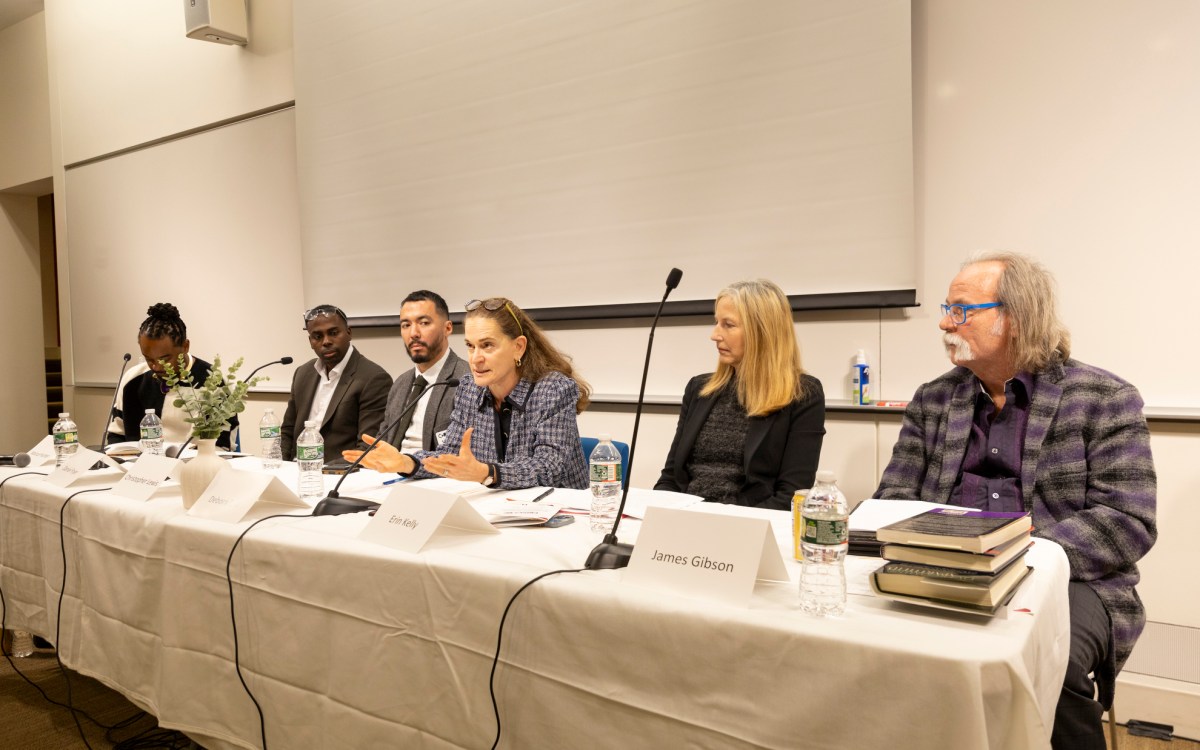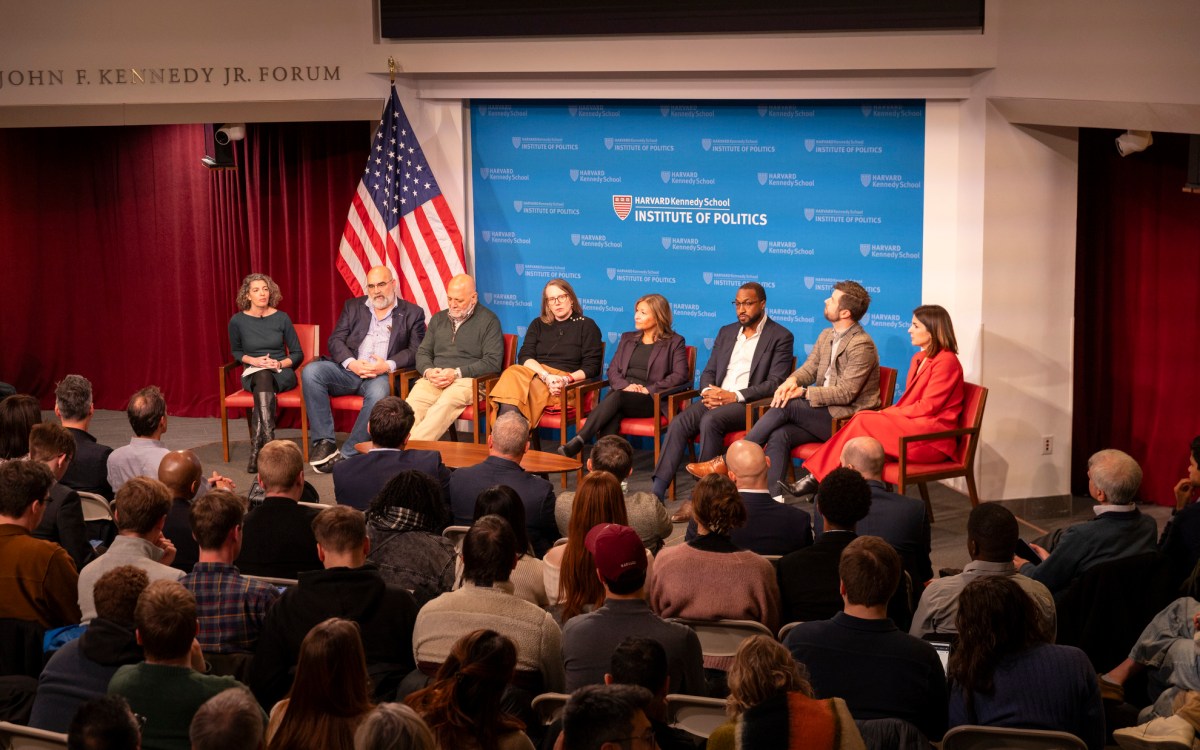Nation & World
-

Unfuzzy math: U.S. needs to do better
Ed School expert has some ideas, including a rethink of homework bans, after ‘discouraging’ results

-

What to expect when you’re elected
Bipartisan group of lawmakers gets to know Washington by way of the IOP
-

Defining and confronting campus antisemitism
Scholars in Jewish Studies say education, conversation can bolster efforts to defeat hate
-

Are reparations the answer?
Harvard symposium explores case for restitution to Black Americans legally, economically, ethically
-

Exact cause of Notre-Dame fire still unclear. But disaster perhaps could’ve been avoided.
Leadership expert says foreseeable factors all contributed to complex failure. Consistent focus needed on best practices, rules, procedures.

-

How the presidency was won, lost
Top campaign leaders from both sides talk about what worked, didn’t at Kennedy School postmortem
-
Pre-emption: Preventive, coercive, or both?
In the wake of 9/11, how to defend the country in a new age of terrorism has sparked an ongoing, often divisive debate. Some consider tactics like pre-emption, the right to use force to respond to an imminent threat, and preventive war, the use of force to prevent a serious threat from worsening over time, acceptable, even if it means occasionally turning a blind eye to the law to preserve national security. Others argue such methods are never warranted and violate the basic tenets of a free, democratic society.
-
Wade hails ‘African renaissance’
His Excellency Abdoulaye Wade, president of the Republic of Senegal, visited Harvard last week (Sept. 27). Looking younger than his 81 years, he walked onto the stage at the John F. Kennedy Jr. Forum to the sound of a tama, a West African “talking drum” used to telegraph complex messages.
-
Conference celebrates tribal governance
Imagine the map of the United States as it really is. Not 50 states, but 50 states plus 562 sovereign nations — the 562 federally recognized American Indian tribes and communities that exist within U.S. borders.
-
At Kennedy School, Iraqi foreign minister outlines recent progress
“Iraq is back,” the country’s foreign minister, Hoshyar Zebari, told his audience at the John F. Kennedy Jr. Forum at the Kennedy School of Government Oct 1. With the dictatorial regime of Saddam Hussein replaced by a “constitutional, democratically elected government,” Iraq is in the midst of “a truly historic transformation” as important as “any event in the Middle East” over the past hundred years.
-
New index quantifies performance of governments
“All citizens of all countries desire to be governed well.” That plain statement — universal and self-evident — is the first sentence of a Harvard-generated report released this week in London. According to its authors, it is the first attempt in the world to systematically and objectively quantify governance.
-
Kozol campaigns for educational reform
At times as he spoke in the Memorial Church last Thursday (Sept. 20) Jonathan Kozol, educator, activist, and author, sounded more fervent than an impassioned man of God preaching eternal salvation.
-
Farmer, Magaziner: Get involved!
Physician and medical anthropologist Paul Farmer and Ira Magaziner, a one-time policy adviser in the Clinton White House, brought humor, counsel, and cautions to a public conversation on student engagement Sept. 20.
-
Serbian foreign minister talks about Kosovo, other issues
Today Vuk Jeremic´ of the Republic of Serbia is, at 32, one of the youngest foreign ministers on the planet. Last week he was back at his alma mater (M.P.A. ’03) to describe his own political odyssey and to face some tough questions about his country’s foreign policy agenda. He made his government’s case for keeping the ethnic Albanian province of Kosovo within Serbia, and warned that if the issue is not handled properly, it could bring back “division and strife and hatred” in the Balkans
-
Changes to system and self necessary for health reform
Major changes, including personal and market-based reforms, are needed in order to bring health coverage to every American, U.S. Health and Human Services Secretary Michael Leavitt told an audience at the John F. Kennedy Jr. Forum on Tuesday (Sept. 25).
-
Panel discusses Petraeus report, future of Iraq
The issue of Iraq continues to draw a crowd as another full house attended the John F. Kennedy Jr. Forum on Monday night (Sept. 17) to hear a panel of Kennedy School professors discuss the recently released report by General David H. Petraeus, the U.S. commander in Iraq, and Ambassador Ryan C. Crocker concerning the military and political situation in the war-torn country.
-
Film and discussion follows thread of conflict in Iraq
“So I guess some of you have issues with the way things are going in Iraq?” Samantha Power, Anna Lindh Professor of Practice of Global Leadership and Public Policy at the Kennedy School of Government, asked a packed house at the John. F. Kennedy Jr. Forum last Thursday (Sept. 13) as she introduced a screening and discussion of the documentary “No End in Sight: The American Occupation in Iraq.”
-
Great deals can be costly for country
In the relentless pursuit of a good deal, shoppers are elbowing citizens out of the public arena, former Labor Secretary Robert Reich warned Thursday evening during the inaugural Kennedy School Forum of the academic year.
-
IFC, U.N. to cooperate on study of investment contracts and human rights
The International Finance Corp. (IFC), which is a member of the World Bank Group, and Kennedy School of Government (KSG) Professor John Ruggie, who is the United Nations secretary-general’s special representative on business and human rights, recently launched a joint study on foreign direct investments and human rights.
-
Close call in Peru
While protestors lobbed rocks through the windows of their hotel, Andrew Krumholz ’09 and his brother Richard ’07 waited apprehensively to see if the police would be able to quell the disturbance. But when they saw the nearby bus station burst into flames, they knew it was time to call for help.
-
Looking at war through a legal lens
The debate over international humanitarian law wrapped up a weeklong executive session for 35 humanitarian workers from around the world, including Sudan, Chechnya, and Uganda. The weeklong program, “Advanced Training on International Humanitarian Law in Current Conflicts: New Challenges and Dilemmas,” was sponsored by the Program on Humanitarian Policy and Conflict Research at Harvard University and the International Committee of the Red Cross.
-
The business of law
Harvard Law School (HLS) is the place to look for the arcana of legal scholarship and practice — and for the latest on evidence, procedure, contracts, property, crime, torts, and taxation.
-
At CGIS, attorney Amsterdam blasts Russian Federation, others
“We’ve got to stop blaming Vladimir Putin,” Robert Amsterdam told his listeners at the Center for Government and International Studies Tuesday morning (May 15). “That does us no good.
-
Italian government provides $1.5M for Sustainability Science Program at CID
The Italian Ministry for the Environment, Land, and Sea has made a $1.5 million gift to support the Fund for Sustainable Development at Harvard’s Center for International Development (CID), it was announced earlier this month. A document-signing ceremony was held May 9 at the Kennedy School of Government (KSG).
-
Weissman Program names interns for ’07
The Weissman International Internship Program, established by Paul (’52) and Harriet Weissman in 1994, provides sophomores and juniors with the opportunity to intern abroad in a field of work related to their career and academic goals. The Weissman Program enables students to develop a richer understanding of the global community in which they live and work, and provides an opportunity for them to share their experiences with the Harvard community when they return. This year’s 39 interns will join the 292 Weissman program alumni who have completed a work experience abroad since the program’s inception.
-
SAI names 2007 grant, internship recipients
The South Asia Initiative (SAI) recently announced its study grants for Harvard graduate and undergraduate students. Sixteen students have also received SAI internships.
-
Secretary of Treasury Paulson talks about China’s booming economy
“Time is of the essence,” Henry Paulson told the capacity crowd at Burden Hall on the Harvard Business School (HBS) campus Thursday afternoon (May 3). China needs to make some critical economic reforms — floating its currency, reforming its capital markets, and restructuring so that domestic consumption plays a bigger role — and the time to make them is now, when China is booming and the global economy is strong.
-
Beijing restrictions offer case study in emissions of key atmospheric gases
The Chinese government’s restrictions on Beijing motorists during a three-day conference last November — widely viewed as a dress rehearsal for efforts to slash smog and airborne pollutants during the 2008 Summer Olympic Games in Beijing — succeeded in cutting the city’s emissions of one important class of atmospheric gases by an impressive 40 percent.
-
Iranian rights abuses systemic
“Iran has a constitution and specific laws that on closer scrutiny turn out not to be laws at all, because they can be interpreted in any way to the advantage of the rulers.”
-
Obama, Giuliani lead packs in race for president among 18- to 24-year-olds
A new national poll by the Institute of Politics (IOP) at the John F. Kennedy School of Government finds former New York City Mayor Rudy Giuliani and U.S. Sen. Barack Obama as 18- to 24-year-olds’ first choices for president in 2008. Nearly six in 10 young people (59 percent) believe the country is “on the wrong track” while only 13 percent believe the country is headed in the “right direction.” On issues facing the nation, 50 percent of young people today say that either “Iraq,” “the war,” the “War on Terror,” or “domestic security” is the most concerning national issue, with no other issue registering higher than 6 percent.
-
Building homes — and understanding
From March 24 to April 2, a unique group of volunteers came together in the community of Ghor Al Safi, Jordan, to build two homes in that community through Habitat for Humanity Jordan. The group consisted of 12 women from Harvard University in the United States and 12 from Dar Al-Hekma College in Saudi Arabia.
-
Mexico: Expedition to Yaxchilan
Harvard scholars travel to Central America in their mission to preserve ancient Maya hieroglyphic inscriptions and iconography.
-
Mexico: Ian Graham, explorer
As an explorer, archaeologist, draftsman and photographer, Graham has devoted his life to making the ancient comprehensible.
-
Advances in genetics can help kids learn
Education was becoming a no-brainer, some people at Harvard’s Graduate School of Education (HGSE) complained. Kurt Fischer and his colleagues looked at the revolution in brain scanning, genetics, and other biological technologies and decided that most teachers and students weren’t getting much benefit from them.
-
Women in science: Good news, bad news
It is the best of times, and it is the worst of times. At Harvard’s fourth National Symposium on the Advancement of Women in Science, it was clear why female scientists need to keep meeting like this.
-
Military model may help close gap
Does the military have anything to teach educators? Absolutely, said Brookings Institution senior fellow Hugh Price, who, 18 months out of Yale Law School in 1968, gave up his career to become a youth counselor.

